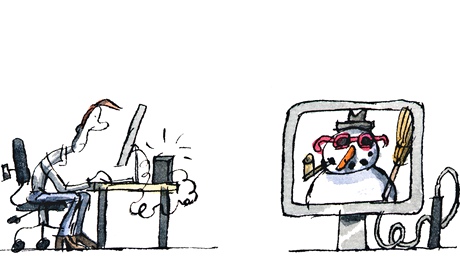
The middle one walks into my office to turn the wireless router on and off. He finds me looking intently at a leaflet titled About Your Recovery.
"From alcohol?" he asks.
"No," I say. "From data loss."
"Oh," he says.
"What do you mean, 'from alcohol?'" I say.
The boy says nothing, pausing only to scrutinise the blinking light on the front of the router on his way out of the door.
In the weeks since I lost all my data, my computer's dead hard drive has been on a journey. It's now in a clean room in Surrey, where people in hairnets and disposable overshoes are awaiting a decision from me. Along with my leaflet, I've received a two-page report estimating the likely percentage of my data that can be recovered: most, if not all, but possibly none. The enormous cost, on the other hand, is not an estimate; nor is it refundable, nor does it include VAT.
My computer has been on a different journey. For an incredibly modest price, it has been fitted with a 1-terabyte hard drive and returned to me, blank as new. A certain amount of data has migrated back: 12,000 old emails pinged into my inbox, and all my music purchases reappeared. But otherwise it's empty. When I turn on my computer in the morning, I feel strangely unencumbered, and correspondingly susceptible to notions of promise. I begin to think that my old data should stay lost.
My wife, meanwhile, is trying to convince me that recovery is something I should seriously consider, whatever the cost.
"We're still talking about my hard drive, right?" I say, jamming an empty wine bottle nose-first into the recycling bin.
"Yes," she says. "What about all your old documents, things you've written?"
"Don't need it," I say. "Chances are I'd never look at it again anyway."
"It's a legitimate business expense," she says, knowing how favourably disposed I am towards language that makes me sound like a businessman.
"Who cares?" I say. "I'm free!"
Some days later, the band I'm in is playing a gig in Sussex. In the interval between sets, I'm manning the CD-and-souvenir-tea-towel stall. A woman starts showing me pictures of her dog on her phone.
"I have dogs," I say, whipping out my own phone in retaliation. As I scroll through to find the most charmingly composed picture of the pair, four years' worth of memories flash before my eyes: red-eyed holiday snaps; accidental shots of the kitchen door; a blurry, vertiginous pap of Phil Tufnell taken by one of my children; photos of Halloween costumes, snake eggs, my dad's flooded front yard, a snowman wearing 3D glasses, my new ladder, a patch of lawn ringed by the shoes of fellow party guests… Suddenly all this stuff – this digital information on which so many fragile memories are pinned, and which exists nowhere but on my old, crack-screened phone – seems terribly important to me. I am as anchored by my data as I am imprisoned by it.
After a week, I receive in the post a black box no bigger than a cigarette packet: the contents of my old hard drive. I plug it into my computer and have a look. As far as I can tell, everything is there: half-finished articles, old invoices, a jpeg of a Mondeo starter motor, the Beach Boys' Greatest Hits. It would be the work of seconds to transfer the lot to my new, giant hard drive. In the end, I decide to keep it all on the black box, in case I one day feel the need to chuck it into a canal.

